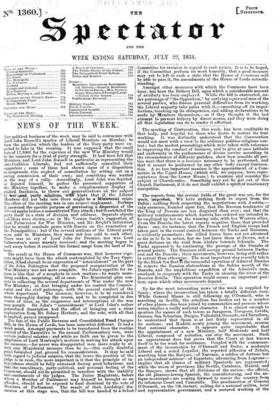NEWS OF THE WEEK.
Tire political business of the week may be said to commence with Lord John Russell's muster of Liberal Members on Monday, to tam the position which the leaders of the Tory party were ex- pected to take in the evening. It was supposed that the small vote of 17,300/. for the expenses of the new War Ministry would be the occasion for a trial of party strength. It had been felt that Ministers, and Lord John Russell in particular as representing the ante-Coalition Liberals, had not sufficiently consulted: their supporters ; some of these had shown signs of a disposition to reciprocate this neglect of consultation by setting out on a roving commission of their own ; and something was wanted in the way of a rally. Accordingly, Lord John was deputed, or deputed himself, to gather the presumed supporters of the Ministry together, to make a complimentary display of I. studied frankness to threw. out ;generalizations on the subject - -hi Vat NOmit party relations, 'WM' hints that if. the Liberal 3fembers did not take care there might be 41-21rinisteria1: crisis. The effect of the meeting was in one respect unpleasant. Perinips it answered the specific purposeiof preventing a dispersion of the
'ranks before a concentrated Tory attack ; but it exhibited the party itself in a state of division and coldness. Separate objects and ideas were shown,—as in Mr. Vernon Smith's suggestion of Lord Palmerston for War Minister, and Mr. Bright's intimation that he would conclude peace with Russia on the evacuation of the Principalities : but if the several sections of the Liberal party were cold to Ministers, they were not less cold to each other. There was no cry of Lord John for Premier, nor was Lord Qalmerston's name warmly. received ; and the meeting began to melt away before it received the formal cone from the host of the hour.
The result in the House of Commons was, that however vigo-
rous might have been the attack contemplated by the Tory Oppo- sition, it had shrunk to an expression of " astonishment " on the part of Sir John Pakington that the proposed reorganization of the War Ministry was not more complete. Sir John's appetite for re- form is like that of a neophyte in such matters—he wants some- thing sudden, surprising, all at once. The Ministerial plan con- sists in collecting the several departments of War under the new War Minister; at first bringing under his control the Commis- sariat and the civil patronage, with the general conduct of the whole department. The measure, however' is to be considered more thoroughly during the recess, and to be completed in due coarse of time, as the exigencies and interruptions of the war may permit. Sir John's " astonishment " at Lord John's rather generalized description had the effect of bringing out a clear explanation from Mr. Sidney Herbert; and the vote, with all that it implied, passed unopposed.
The fate of the Public Revenue and Consolidated rand Charges Bill, in the House of Lords, has been somewhat different It had a 'weak point. Amongst payments to be transferred from the routine control of the Executive to the annual Parliamentary vote, were certain judicial salaries ; and while no faith can be given to the singleness of Lord Monteagle's motives in making his attack upon the nieasure,—for never was disappointed man more ready to at- tack any Ministerial measure than he is,—this really doubtful Point furnished just ground for reconsideration. It may be said with regard to judicial salaries, that the lower the position of the judge is in rank, the more important is it that the principle of in- dependence should be fully sustained during good behaviour, and that the tumultuary, party-political, and personal feeling of the Commons, should not be permitted to interfere with the stability and emoluments of the judges. The Police Magistrate, before whom a Member of Parliament may himself be brought as an offender, should not be exposed to final dismissal by the vote of Members of Parliament. The result of their Lordships' dis- cussion at this stage was, that the bill was handed to a Select Committee for revision in regard to such points. It is to be hoped, if the Committee perform its work honestly, that a good measure may yet be left in such a state that the House of Commons will be able' to pass it, the amendments of the House of Lords notwith- standing. '
AmMigst other measures with which the Commons have been -busy, has been the Bribery Bill, upon which a considerable amount of assiduity has been employed. While the bill is obstructed, un- der patronage of" the Opposition," by outlying equivocal men of the several parties, Who foresee personal difficulties from its working, the Liberalmajority take pains with it —smoothing off its imper- 'le-66°ns, -Couching up its stringencies, and adding declarations to be 'made by:.24-esilbers thernselves,—as if they thought it the last attempt to prevent bribery by direct means, and they were doing all that legit-Ligon can do to render it effectual.


























